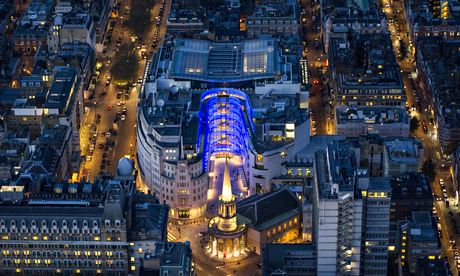
The BBC must tackle a "culture of complacency" in the way it spends licence fee payers' money, MPs say, after describing the corporation's bungled £100m Digital Media Initiative as a "complete failure".
The House of Commons public accounts committee delivered a damning verdict on the DMI, which aimed to do away with an extensive video archive and editing system and create a YouTube-like "tapeless" environment, which was scrapped by BBC director general Tony Hall in his first few weeks in the job, at a cost of £98.4m.
The committee's chair, Labour MP Margaret Hodge, said the BBC was "far too complacent" about the risks inherent in the project and said the BBC Trust, chaired by Lord Patten, "demonstrated similar complacency" and was guilty of "poor oversight".
Hodge, speaking ahead of the committee's report into the affair, published on Thursday, said: "The BBC's Digital Media Initiative was a complete failure. Licence fee payers paid nearly £100m for this supposedly essential system but got virtually nothing in return."
The report said the committee had been "misinformed" about the progress of the system when BBC executives, including the then director general, Mark Thompson, appeared before MPs in 2011.
Thompson told the committee that the technology was in general use, when in fact it had only ever been used on one programme, BBC1 science show Bang Goes The Theory.
The former director general, now chief executive of the New York Times Company, used his appearance before the committee in February to "apologise to you and the public" over the project.
Hodge accused corporation executives of being less than transparent, saying it was "not clear why the BBC failed to share important evidence" including a 2010 report about DMI.
"Lack of clearly defined responsibility and accountability meant that the corporation failed to respond to warning signals that the programme was in trouble," added Hodge.
"Both the BBC executive and the trust need to overhaul their approach to managing and implementing major projects so that they properly safeguard licence fee payers' money."
The committee's report is the latest in a long line of critical investigations into the DMI debacle, including an inquiry by the National Audit Office in January which documented a catalogue of mistakes.
The only usable system delivered by DMI was an archive and ordering system that was slower than the 40-year-old process it was intended to replace, with just 163 staff and a running cost of £3m a year, four times the £780,000 annual cost of its archaic predecessor.
The BBC's former chief technology officer John Linwood, who paid for the DMI fiasco with his job last summer, is understood to be continuing his legal action against the corporation.
The committee called on the BBC Trust to "set out … what changes it will make to be more proactive in chasing and challenging the BBC executive's performance in delivering major projects so that it can properly protect the licence fee payers' interest".
A BBC spokesman said: "Tony Hall was right to scrap the DMI project when he took over as director general last year.
"As we said at the time, the BBC didn't get DMI right and we apologised to licence fee payers. We have completely overhauled how these projects are delivered so that there is crystal clear accountability and transparency."
DMI was begun by Siemens before the BBC took it in-house in 2009. The committee said it was "unclear" why the corporation thought it could complete what the electronics giant had failed to deliver. It spent a total of £125.9m on the scheme.
A spokeswoman for the BBC Trust said: "As we have said before, this represented an unacceptable loss to licence fee payers.
"Acting on the conclusions of previous reports into DMI, we have strengthened reporting to the Trust so that problems are spotted early and dealt with quickly. We are also carrying out follow-up reviews once projects are completed to make sure the lessons from DMI are being implemented."
• To contact the MediaGuardian news desk email media@theguardian.com or phone 020 3353 3857. For all other inquiries please call the main Guardian switchboard on 020 3353 2000. If you are writing a comment for publication, please mark clearly "for publication".
• To get the latest media news to your desktop or mobile, follow MediaGuardian on Twitter and Facebook.

